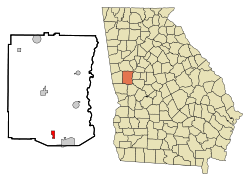Warm Springs, Georgia
| Warm Springs, Georgia | |
|---|---|
| City | |

Broad Street in Warm Springs.
|
|
 Location in Meriwether County and the state of Georgia |
|
| Coordinates: 32°53′19″N 84°40′48″W / 32.88861°N 84.68000°WCoordinates: 32°53′19″N 84°40′48″W / 32.88861°N 84.68000°W | |
| State | Georgia |
| County | Meriwether |
| Area | |
| • Total | 1.2 sq mi (3.1 km2) |
| • Land | 1.2 sq mi (3.1 km2) |
| • Water | 0 sq mi (0 km2) |
| Elevation | 930 ft (280 m) |
| Population (2010) | |
| • Total | 478 |
| • Density | 398.3/sq mi (153.8/km2) |
| Time zone | Eastern (EST) (UTC-5) |
| • Summer (DST) | EDT (UTC-4) |
| ZIP code | 31830 |
| Area code(s) | 706 |
| FIPS code | 13-80480 |
| GNIS feature ID | 0324851 |
Warm Springs is a city in Meriwether County, Georgia, United States. The population was 478 at the 2010 census.
Warm Springs, originally named Bullochville (after the Bulloch family, the family of Martha Bulloch Roosevelt), first came to prominence in the 19th century as a spa town, because of its mineral springs which flow constantly at nearly 90 °F (32 °C). Residents of Georgia, particularly Savannah, began spending vacations at Bullochville in the late 18th century as a way to escape yellow fever, finding the number of warm springs in the vicinity of Bullochville very attractive. In the late 19th century traveling to the warm springs was attractive as a way to get away from Atlanta. Traveling by railroad to Durand, they would then go to Bullochville. One of the places benefiting from this was the Meriwether Inn. Once the automobile became popular in the early 20th century, the tourists began going elsewhere, starting the decline of the Meriwether Inn.
In 1921, Franklin Roosevelt contracted polio. One of the few things that seemed to ease his pain was immersion in warm water, and while in said water to bathe and engage in physical exercise. His first time in Warm Springs was October 1924. He went to a resort in the town whose attraction was a permanent 88-degree natural spring, but whose main house was described as "ramshackle". It is famous for the Little White House, where Roosevelt lived while president, because of his paralytic illness. He died there in 1945 and it is now a public museum. Roosevelt first came in the 1920s in hopes that the warm water would improve his paraplegia. He was a constant visitor for two decades, and renamed the town from Bullochville to Warm Springs. The town is still home to the Roosevelt Warm Springs Institute for Rehabilitation (Roosevelt's former polio hospital) which remains a world-renowned comprehensive rehabilitation center including a physical rehabilitation hospital and vocational rehabilitation unit. The springs are not available for public use as a bath/spa resort, but they are used by the Roosevelt Institute for therapeutic purposes.
...
Wikipedia
